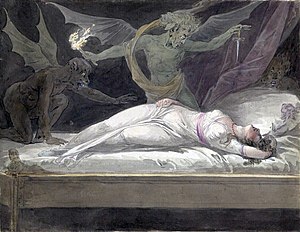Incubus and succubus myths

| Preach to the choir Religion |
| Crux of the matter |
| Speak of the devil |
| An act of faith |
The incubus and succubus are mythical creatures from Medieval Christian demonology that perform their evil deeds by doing the deed with their victims. The incubus is the male version of the demon while the succubus is the female counterpart.
In Christianity[edit]
The exact origin of the myth is unknown, though St. Augustine mentioned sexual creatures in some of his works.[1] The first actual mention of the succubus comes from the 1300's.
There are a few basic variations on the myth. In some accounts, the incubus and succubus are two separate demons. The incubus impregnates women with its demon semen while the succubus impregnates itself using a man with its deviled egg. In others, the incubus and succubus are the same shape-shifting demon which needs to collect semen as a succubus first before it transforms into an incubus to impregnate a woman. Less often, these demons use sexual intercourse as a means to directly possess the body of their victims. This is generally done while the victim is sleeping.
The means by which incubi and succubi were to be dealt with were laid out in the Malleus Maleficarum. Exorcism and confession were considered the two best methods for disposing of the demons. Some of the kookier fundamentalists still believe in the existence of these demons and seek out or offer exorcisms to get rid of them.[2]
In other cultures and religions[edit]
Many other cultures have sex demons as part of their mythology that are analogous or similar to the incubus and succubus.[3] In Arabic cultures, jinns were thought to be responsible for the same acts; Sila![]() are a specific type which according to legend appears in shape of a woman, seducing men into dancing, marrying, and fathering their half-genie young. There are also a number of non-sexual variants which generally involve the demon pinning the person to the bed, and strangling or suffocating them in some way.
are a specific type which according to legend appears in shape of a woman, seducing men into dancing, marrying, and fathering their half-genie young. There are also a number of non-sexual variants which generally involve the demon pinning the person to the bed, and strangling or suffocating them in some way.
Many of the succubus myths are derived from Jewish mysticism and Kabbalah. The most famous succubus is Lilith,![]() who is believed to have been the first woman instead of Eve. She became a succubus after leaving the Garden of Eden and having sex with the archangel Samael.[4] Of note is that Lilith left because Adam and God didn't want her because she (*gasp!*) refused to be a submissive doormat to Adam and wanted to be independent, so Adam threw a hissy-fit and God made Eve in response. The mistresses of Samael were thought to be the first succubi.
who is believed to have been the first woman instead of Eve. She became a succubus after leaving the Garden of Eden and having sex with the archangel Samael.[4] Of note is that Lilith left because Adam and God didn't want her because she (*gasp!*) refused to be a submissive doormat to Adam and wanted to be independent, so Adam threw a hissy-fit and God made Eve in response. The mistresses of Samael were thought to be the first succubi.
In Arthurian legend, Merlin is a cambion,![]() the child of an incubus with a human woman, who subsequently became a nun.[5] In modern-day comic books, Raven
the child of an incubus with a human woman, who subsequently became a nun.[5] In modern-day comic books, Raven![]() of Detective Comics' Teen Titans
of Detective Comics' Teen Titans![]() is sired under similar circumstances by the inter-dimensional demon Trigon.
is sired under similar circumstances by the inter-dimensional demon Trigon.![]() In almost every case, the mother is human, rather than the other way around.
In almost every case, the mother is human, rather than the other way around.
Explanations[edit]
Due to the widespread prevalence of these myths, many anthropologists and psychologists believe them to be supernatural explanations for sleep paralysis and hypnagogic and hypnopompic hallucinations.[6] A common thread in these stories is an inability to move, which fits well with sleep paralysis. They also speculate that in religions with sexual taboos like Christianity, the demons offered a convenient "devil made me do it" excuse. Unwanted pregnancies, incest, and nocturnal emissions (intentional or not) could be blamed on incubi or succubi.
The sleep paralysis and sexual encounters bear some resemblance to what is sometimes passed off today as alien abduction. Purported victims of such abductions regularly report being frozen in bed and sexual reproduction with aliens or probing is also a common thread. The underlying psychological experience is likely to have been very similar, but explained away by whatever was most culturally relevant at the time: in older times, demons, and in more modern times, extraterrestrials.
References[edit]
- ↑ Demonologists and Theologists on the Existence and Nature of Sexual Demons
- ↑ For example, this webshite serves up a bunch of green ink on incubi and succubi.
- ↑ Paranormal Paramours, Committee for Skeptical Inquiry
- ↑ The Story of Lilith, The Alphabet of ben Sira Question #5 (23a-b)
- ↑ "Merlin’s Conception by Devil in William Rowley’s Play The Birth of Merlin", Anita Obermeier, Project Muse
- ↑ Incubus Attack, Psychology Today
